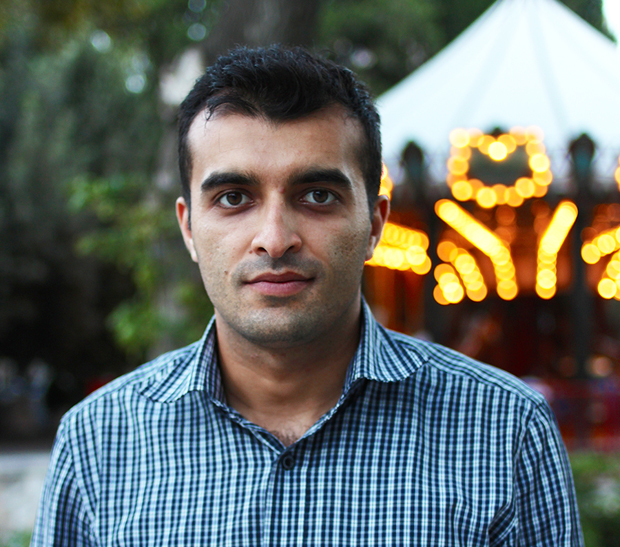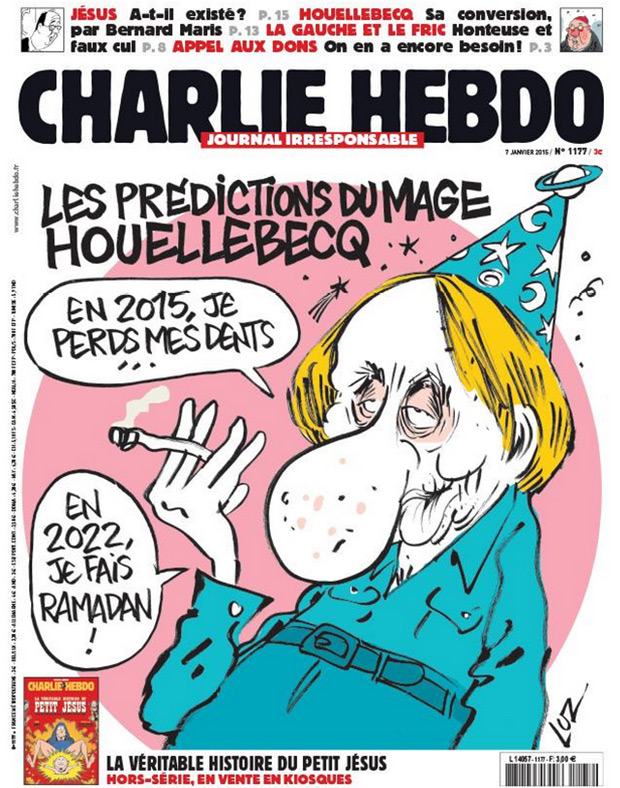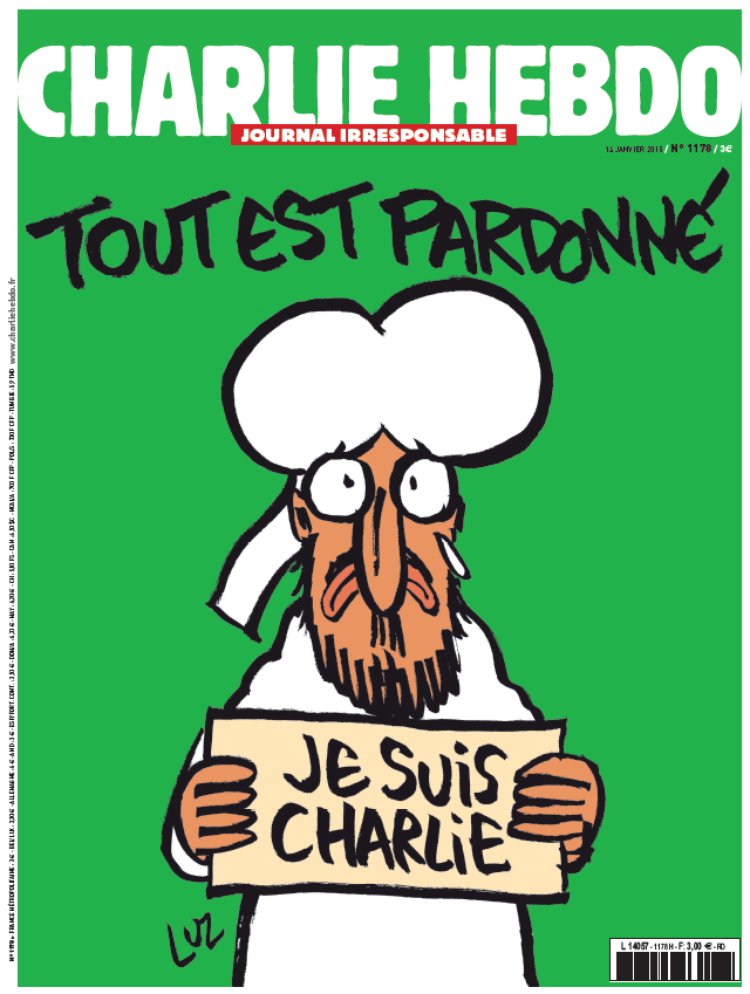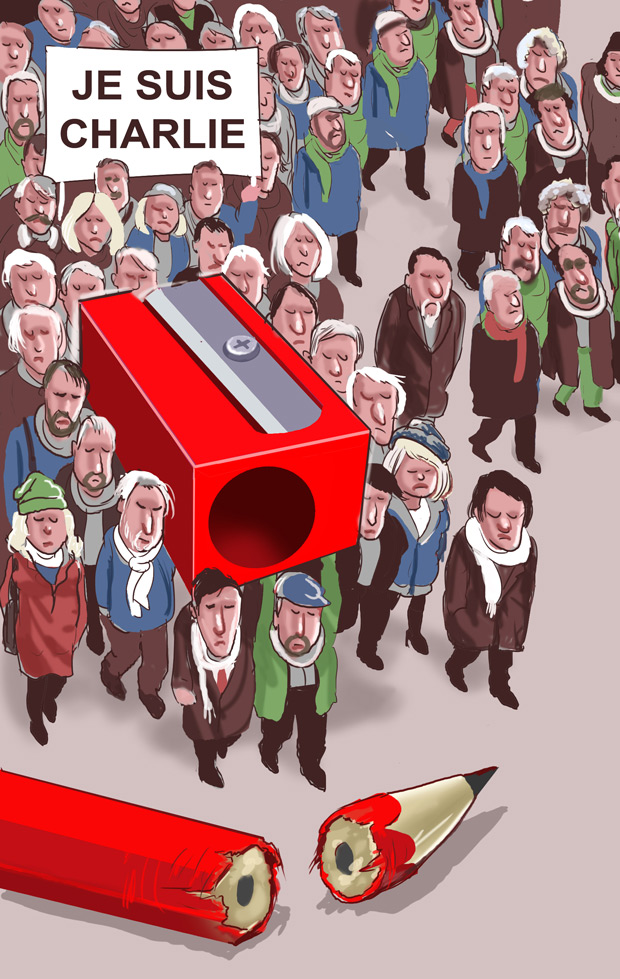15 Jan 2015 | Azerbaijan, Azerbaijan News, Europe and Central Asia, News and features

Rasul Jafarov in September 2013 (Photo: Melody Patry)
Locked in a double iron cage in a packed courtroom, Azerbaijani activist and regime critic Rasul Jafarov saw his trial open on Thursday.
Detained since 2 August, Jafarov stands accused of crimes including tax evasion, illegal entrepreneurship, abuse of office and forgery. The charges are widely believed to be trumped up and in connection to his human rights campaigning works. He could be sentenced to up to 12 years in prison.
Citing a lack of evidence of guilt, Jafarov’s lawyers requested the case be dropped, reported contact.az. They also asked, among other things, that he be allowed to sit with them. Both requests were denied.
The case against Jafarov is part of an ongoing onslaught against critical civil society by Azerbaijani authorities. Campaigners Leyla and Arif Yunus and lawyer Intigam Aliyev were all arrested around the same time as Jafarov, and remain in detention. Investigative journalist Khadija Ismayilova, who has reported on official corruption, was detained on 5 December 2014. Journalist Seymur Hazi, who has worked for Index journalism award winning Azadliq newspaper, is also in detention. There are currently more than 90 reported political prisoners in Azerbaijan.
In a recent development, authorities raided the Azerbaijan bureau of the US-funded Radio Free Europe/Radio Liberty.
Jafarov, 30, is chairman of the organisation Human Rights Club, and one of Azerbaijan’s most prominent human rights activists. When capital Baku hosted the Eurovision Song Contest in 2012, he organised the Sing for Democracy campaign to draw attention to rights abuses by President Ilham Aliyev’s government. Aliyev has been in power since 2003, succeeding his father Heydar. In 2013 he was re-elected for a third term, amid claims of voting fraud.
Jafarov was also planning on staging a Sport for Rights campaign when the inaugural European Olympics come to Baku this summer.
In August, he wrote an appeal to the international community from jail, saying that “the past 2-3 years everyone was asking half-joking, half-serious, when I was going to be arrested. It happened, and now I’m looking forward to your support!”
“As we focus on threats to free expression in countries like France in the wake of the attacks on Charlie Hebdo, it is vital that we remember the plight of the thousands of individuals worldwide facing daily harassment, threats of violence, and detention, for exercising their rights to free speak freely,” said Index CEO Jodie Ginsberg.
“Azerbaijan is one of the world’s worst countries for free speech. We call on the Azerbaijan government to release Rasul, and others detained for attempting to speak out about the country’s deplorable human rights record. We also urge other governments – who have professed so volubly in recent days their believe in the importance of free speech — to join our call for Rasul’s release.”
“The arrest of Rasul Jafarov, along with other main human rights defenders in Azerbaijan, such as Intigam Aliyev, Leyla Yunus, Anar Mammadli or journalist Khadija Ismayil, shows how the authorities handle critics: there is no space for dialogue in society but enough space for repression and imprisonment,” Florian Irminger, head of advocacy at the Human Rights House Foundation, said.
This article was posted on 15 January 2015 at indexoncensorship.org
15 Jan 2015 | Europe and Central Asia, France, News and features, Politics and Society, Religion and Culture, United Kingdom

Rashid Razaq is a reporter for London Evening Standard and a playwright.
What is the solution to the Muslim Problem? Britain has tried multiculturalism; the French, a stricter enforcement of secularism. Neither has been an unequivocal success.
I’m afraid I don’t have the answer. I have only doubts and questions, whereas the terrorists have certainties and guns.
The only thing I can say with a fair amount of confidence is that the right not to be offended is a ridiculous thing. For there is no way to measure a subjective, emotional state other than to ask “Does this offend you?” in the same way you would ask “Are you tired?”, “Are you hungry?”, “Do you love me?”
One person’s silly cartoon is another person’s existential threat. Try as I might, I cannot get offended by a drawing. Maybe I’m a bad Muslim, maybe a true believer would be so mortally wounded by an image, any image, of the Prophet Mohammed that the only remedy is bloodshed. But I don’t think that’s the case. Much of the outrage is manufactured, stoked up by rabble-rousers for political purposes. Because that’s the brilliance of the right not to be offended (Irony — just to be crystal- clear): you can get offended on other people’s behalf, you can get offended about books you haven’t read, about things that may or may not exist.
Loath as I am to bring up scripture in a discussion about religion, the Islamic prohibition against making graven images of the Prophet Mohammed only really applies to Muslims. It stems from the same commandment not to worship false idols, intended to protect against idolatry.
As far as I’m aware neither Stephane Charbonnier nor any of his leading cartoonists at Charlie Hebdo was a practising Muslim. The two victims believed to be Muslims, copy-editor Mustapha Ourad and policeman Ahmed Merabet, appear to have been collateral damage rather than targets.
So, just to make the murders even more pointless, you have Muslims killing non-Muslims for not sufficiently respecting something which they don’t believe in. Irony? I’m not sure.
Not that there is any justification. It is a shabby excuse for a heinous act, convenient religious cover for something that is probably nothing more than a twisted marketing stunt for al Qaeda in Yemen, if initial accounts prove to be true. The killings were not carried out to “avenge” the Prophet’s honour. Their real intent was to remind the West: “We’re still here”.
Many lofty and true words will be written about the need to protect the freedom of expression. But the attack on Charlie Hebdo wasn’t an attack on freedom of expression. It was an attack on an easy target. A group of middle-aged, unarmed cartoonists were never going to be much of a match for battle-hardened jihadists brandishing Kalashnikovs.
Satire is scary for people who can’t live with doubt. Because satire is all about creating doubt, questioning the way things are done, challenging those in power, pushing for change. I don’t know if the killings say more about the power of satire or the weakness of the gunmen’s supposed faith.
The jihadists want us to accept their narrative, that they are brave holy warriors and not just some over-sensitive, bloodthirsty bullies. But I have my doubts. I think the terrorists continue to provoke fear because they’re afraid. Afraid that we’ll realise their brand of religion is a joke.
This article was originally posted at London Evening Standard on January 12, 2015. It is reposted here with permission.
14 Jan 2015 | Campaigns, Statements
The arrest of French comedian Dieudonné today appears to be connected to a Facebook comment he posted after Sunday’s march in Paris in which he said he felt he “finally returned home… I feel like Charlie Coulibaly” – remarks that have been interpreted as condoning the action of one of the terrorists involved in the killings of 17 people in Paris last week.
It is important to be clear that while incitement to terrorism is a crime, commentary or jokes about terrorism – no matter how offensive or tasteless – are not. Opinions are protected by the right to freedom of expression.
“You cannot address bigoted and offensive ideas by banning them. To do so simply drives them underground,” said Index CEO Jodie Ginsberg. “The attacks on Charlie Hebdo should be a spur to every one of us to defend ever more vigorously free speech in all forms – even and especially when it represents opinions we find abhorrent or disagree with – so that all views are represented and can be challenged.”
The full text of the Dieudonne remark, later deleted, is as follows: “After this historic march what do I say…Legendary. Instant magic equal to the Big Bang that created the universe. To a lesser extent (more local) comparable to the coronation of Vercingétorix, I finally returned home. You know that tonight as far as I’m concerned I feel like Charlie Coulibaly”.
As Article 19 points out in a statement today, publicly condoning (faire publiquement l’apologie) acts of terrorism is a crime under Article 421-2-5 of the French Criminal Code.
The offence is punishable with up to five years’ imprisonment, and a fine of €75,000. Harsher penalties for the offence are available when it is committed online, allowing up to seven years’ imprisonment and a fine of €100,000.
“International standards are clear that terrorism offences should not be so broad or vague as to encompass expression where there is no actual intent to encourage or incite terrorist acts,” Article 19 said. “To impose criminal sanctions, there must be a direct and immediate connection between the expression at issue, and the likelihood or occurrence of such violence.”
12 Jan 2015 | News and features, Statements, Turkey Statements

Tout est pardonne or all is forgiven, the first post attack cover of Charlie Hebdo
If you said “I believe in free expression, but…” at any point in the past week, then this is for you. If you declared yourself to be “Charlie”, but have ever called for an offensive image to be removed from public viewing, then this is for you. If you “liked” a post this week affirming the importance of free speech, but have ever signed a petition calling for a speaker to be banned, then this is for you.
Because the rush to affirm our belief in free expression in the wake of Charlie Hebdo attacks ignores a simple truth: that free speech is being eroded on all sides, and all sides are responsible. And it needs to stop.
Genuine free expression means being able to articulate thoughts, feelings and ideas without fear of harm. It is vital because without it individuals would be subject to the whim of whichever authority dictated what ideas and opinions – as opposed to actions – are acceptable. And that is always subjective. You need only look at the world leaders at Sunday’s Paris solidarity march to understand that. Attendees included Ali Bongo, President of Gabon, where the government restricts any journalism critical of the authorities; Turkish Prime Minister Ahmet Davutoglu, whose country imprisons more journalists in the world than any other; and the UK’s David Cameron, who declared his support for free expression and the right to offend, while his government considers laws that could drive debate about extremism underground.
It is precisely the freedom for others to say what you may find offensive that protects your own right to express your views: to declare, say, your belief in a God whom others deny exists; or to support a political system that others dismiss. It is what enables scientific and academic thought to progess. As soon as we put qualifications around “acceptable” free expression, we erode its value. Yet that is precisely what happened time and again in response to the Charlie Hebdo attacks, with individuals simultaneously declaring their support for free expression while seeming to suggest that the cartoonists and anyone else who deliberately courts offence should choose other ways to express themselves – suggesting that the responsibility for “better” speech always lies with the person deemed to be causing offence rather than the offended.
“The free communication of ideas and opinions is one of the most precious of the rights of man. Every citizen may, accordingly, speak, write and print with freedom…”
French National Assembly, Declaration of the Rights of Man, August 26, 1789
Index believes that the best way to tackle speech with which you disagree, including the offensive, and the hateful, is through more speech, not less. It is not through laws and petitions that restrict the rights of others to speak. Yet, increasingly, we use our own free speech to call for that of others to be limited: for a misogynist UK comedian to be banned from our screens, or for a UK TV personality to be prosecuted by police for tweeting offensive jokes about ebola, or for a former secretary of state to be prevented from giving an address.
A project mapping media freedom in Europe, launched by Index just over six months ago, shows how journalists are increasingly targeted in this region, including – prior to last week’s incidents – 61 violent attacks against the media. Globally, the space for free expression is shrinking. We need to reverse this trend.
If you genuinely believe in the value of free speech – that all ideas and opinions must be heard – then that necessarily extends to the offensive and the vile. You don’t have to agree with someone, or condone what they are saying, or the manner in which it is said, but you do need to allow them to say it. The American Civil Liberties Union got this right in 1978 when they defended the rights of a pro-Nazi group to march in Chicago, arguing that rights to free expression needed apply to all if they were to apply to any. (As did charity EXIT-Germany late last year, when it raised money for an anti-fascism cause by donating money for every metre walked during a neo-Nazi march).
Countering offensive speech is – of course – only possible if you have the means to do so. Many have observed, rightly, that marginalisation and exclusion from mainstream media denies many people the voice that we would so vociferously defend for a free press. That is a valid argument. But this should be addressed – and must be addressed – by tackling this lack of access, not by shutting down the speech of those deemed to wield power and privilege.
Voltaire has been quoted endlessly in support of free expression, and the right to agree to disagree, but British author Neil Gaiman, who discusses satire and offence in the latest Index magazine, also had it right. “If you accept — and I do — that freedom of speech is important,” he once wrote, “then you are going to have to defend the indefensible. That means you are going to be defending the right of people to read, or to write, or to say, what you don’t say or like or want said…. Because if you don’t stand up for the stuff you don’t like, when they come for the stuff you do like, you’ve already lost.”
In the coming weeks, Index will redouble its efforts to build greater understanding of the benefits of free speech, to promote a better informed and wider public debate on censorship, and on offence. We will run a series of articles, public debates and workshops to encourage people to consider what it really means to support free expression, with the aim of reversing a tide of censorship-by-offence, and encouraging more speech, not less.
What can you do? Join the debate. #Keeptalking
This article was posted on 12 January 2015 at indexoncensorship.org




